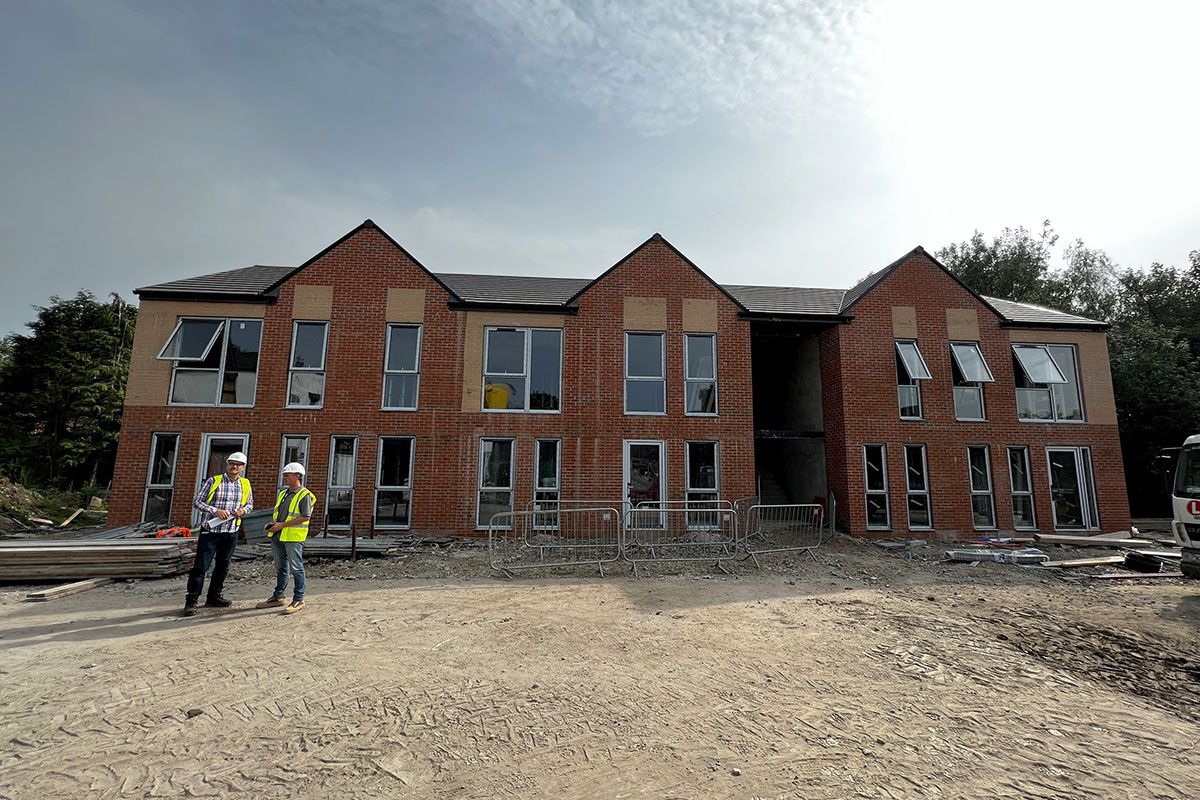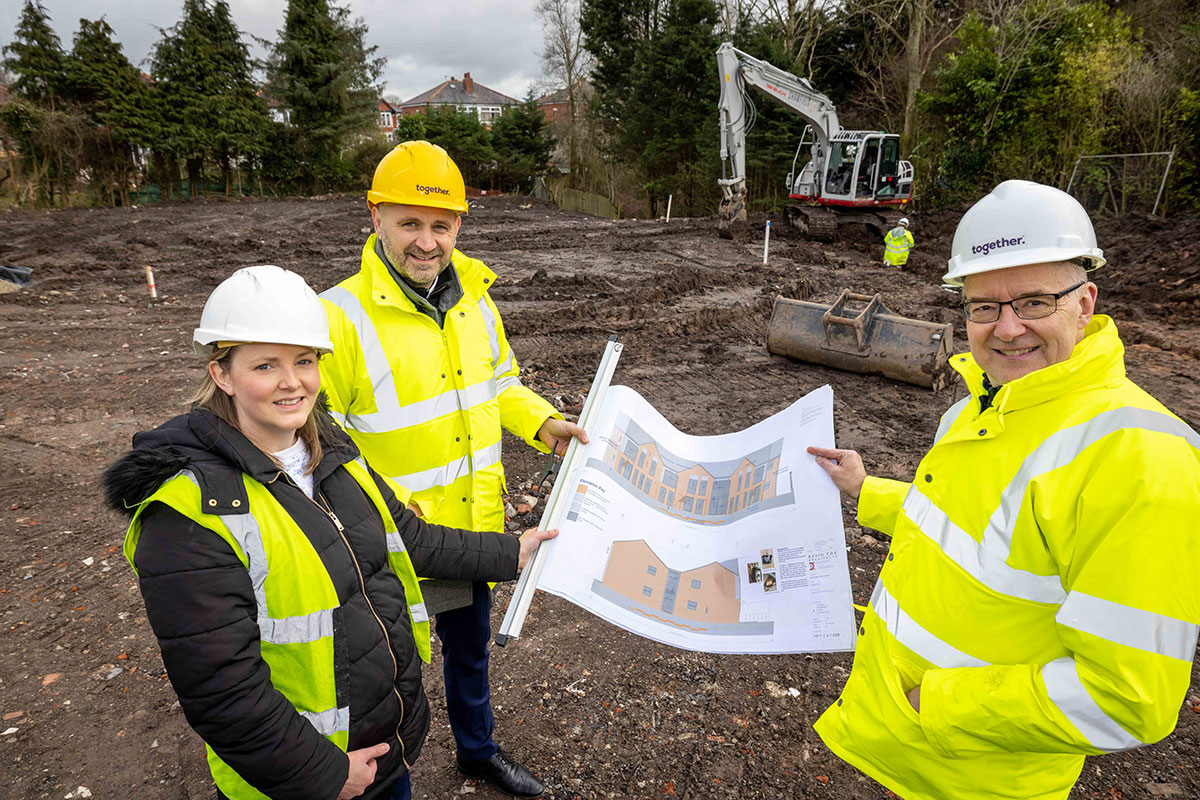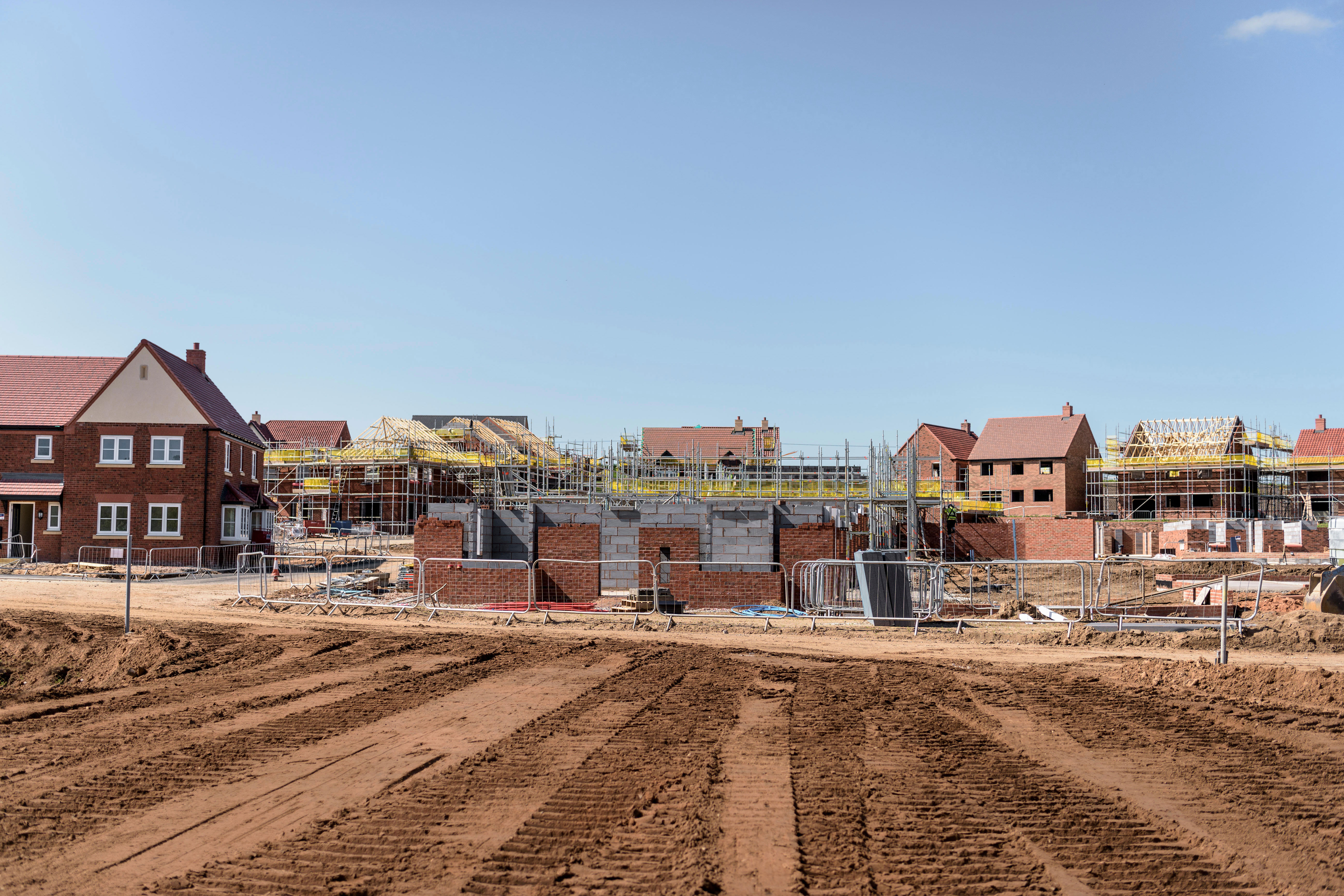New assisted living development from Manchester-based Weaver Finch is success due to close alliances during build
A scheme involving social housing funder Together showcases how collaboration makes the building process smoother

In association with:
![]()
Mornington Road, Preston
Fishwick Ramblers Club, on Mornington Road, Preston, had seen better days. Built in the 1920s, it was once a working men’s club and centre for crown green bowling, but after struggling financially it closed in 2014, fell into disrepair, and was affected by fly-tipping and vandalism.
Now Manchester-based developer Weaver Finch is transforming the site by creating a 13-bedroom, two-storey, hi-tech assisted living apartment scheme on what used to be the bowling green. Construction began in January and is due to be completed in December.
In early 2024, it will become home to autistic tenants and residents with other complex needs who want to live independently.
Collaboration between stakeholders
Andrew Hynes, director at Weaver Finch, notes that close collaboration between stakeholders has been critical to the development’s successful – and relatively tight – turnaround. The developer’s proactive stance has also made a big impact. Rather than find some land, design a building and then seek planning permission, Weaver Finch did things differently by approaching Lancashire County Council first to find out about the type of care schemes it was looking for.
“We engaged with David Lovelady, commissioner at Lancashire County Council,” says Mr Hynes. “I said we were looking to develop these [supported living] schemes and what are the requirements? He told us, effectively, that there is a requirement in every town across Lancashire because there is an insufficient volume of this type of accommodation, so we scoured the market for the right sites and eventually lasered in on Mornington Road.”
Weaver Finch bought the site in December 2020 and began working with Preston-based David Cox Architects on the design. “We presented those plans to the commissioner, who spoke to the head of service at Preston City Council,” says Mr Hynes. “[It was important to get] their input at this early stage to make sure that what we were designing was going to be acceptable [and give us the] confidence to submit a full planning application.” Planning consent was given in 2021.
When it came to finding the £1.75m loan for the project, Weaver Finch met with property finance specialist Together, which was impressed by the firm’s early engagement with the commissioners. A Joint Contracts Tribunal Standard Building Contract had been lined up with contractor Tyson Construction, a Blackpool-based firm with experience in building affordable housing schemes with associations and local authority partners. Weaver Finch was also in talks with Care Housing Association, based in Rawtenstall, Lancashire, to be the end user. “As far as Together was concerned, all the bits of the jigsaw were fitting,” says Mr Hynes. “Together were on our wavelength. They understood the product, the market, the need and the nuances – and the housing association side of it as well.” Despite base rate increases, Together also maintained a development finance rate for Weaver Finch while final agreements were made.
At the start of the development, Weaver Finch found itself dealing with all the parties independently: the funder, quantity surveyor, planning consultants, architects, council, housing association, etc. The trick has been forming a close-knit collective. “You’ve got all these plates spinning,” says Mr Hynes. “And then, eventually, it all comes together. When we had our first meeting on site in February, we had everybody there: we had the architects, the local councillor came down, we had David Lovelady, the commissioner, and we had the housing association. The whole team assembled as spades were breaking the ground.”
Regular stakeholder meetings have since been held online and on site so that everyone can keep up to speed with the build’s progress.

Early engagement
Philip Helm, business development director at Tyson Construction, agrees that strong collaboration is vital. “Collaboration is in our firm’s DNA,” he says. “We invest a considerable amount of time collaborating early on in a project so that we can advise on, and influence, basic buildability. It makes a project a lot easier to deliver and manage if we are able to influence things at the early stage, rather than halfway through a scheme, where specification [hasn’t been] overly clear.”
The excellent architectural drawings for Mornington Road meant this wasn’t really an issue, notes Mr Helm, although Tyson did suggest alterations to the original elevational treatment to make the overall build a more viable option for Weaver Finch.
Joined-up thinking is critical for programming and timetabling purposes, too, argues Mr Helm. “We like to let our specialist subcontractors know what they are going to be doing – and at what times,” he says.
It is also necessary from a financial point of view, particularly in the current economic climate. Having up-front conversations about build costs can prevent any nasty surprises down the line.
“Build cost inflation has slowed down markedly in the past quarter,” admits Mr Helm. “But [since] January 2020, [it] has probably gone up 20%-25%. We can cover some of that, and our sub-contractor supply chain can cover some of that. But, ultimately, the client has got to realise that the world is a bit different to how it was.”
Cost-planning
There was a process of cost-planning between Tyson Construction and Weaver Finch, which took around 18 months. “Viability is key,” says Mr Helm. “We had to get the scheme costed to something within budget, but that also met the requirements of Care Housing Association.”
2024
When residents will move in
13
Bedrooms in the Mornington Road assisted living apartment scheme
Care is a charity, so what assurances did it need before signing on to a project such as this?
“We need all parties on board,” explains Matthew Eddisford, chief executive of Care. “We need the commissioners to confirm that they’ll support [the development] long term. We need the rent agreed. We need the care provider in place. We need to do our due diligence on all the parties before we can think about entering into an agreement. Everyone needs to be singing from the same hymn sheet.”
For example, early on, Care had an honest discussion about rent levels and maintenance costs. “We made it clear the rent can’t increase,” says Mr Eddisford. “We all know what’s been happening in the maintenance world and the cost of building materials and labour. So, before going ahead, we wanted to nail that down.”
Being brought onto the scheme as early as possible gave Care the opportunity to provide input from a health, safety, compliance and sustainability standpoint. “We work with the care provider – in this case the local authority – to discuss the support package,” says Mr Eddisford. “What support elements do we need to factor in? How independent are future tenants and what will be their level of support? Because as well as identifying it for the initial cohort, we’ve got to [think about] what happens if they move on in five years.”
For Tyson Construction, Mornington Road has been a way to build new stakeholder connections for the future. “This is our first project with Together,” says Mr Helm. “We like to think that if we are able to do a good job, then that’s a new relationship we’ve formed.”
For Weaver Finch, carrying out proper due diligence on all the stakeholders gave the firm confidence that it would be working with the best people to ensure a smooth project delivery. It means that Mr Hynes, for one, would be keen to work with the same team again.
“Because of the nature of [the project] and the fact that it is a significant investment, we have to engage with the right people all the way through,” he says. “Now we’ve got the right team together, we’ll repeat the exercise multiple times. [All stakeholders are] invested and can see what we’re looking to achieve. And, at the end, there’s a huge need for it.”
“One weak link in a multi-stakeholder chain can have devastating consequences for an entire scheme”
Alex Bodie, head of social housing funding at funder Together
As the housing crisis continues to bite and the demand for supported and assisted living schemes increases, you might think it would be important to get these types of accommodation projects over the line as quickly as possible. And you’d be right. But for those involved in funding, creating and bringing these developments to completion, that can’t mean cutting corners, ignoring due diligence processes or working in a siloed way.
Indeed, when it comes to development projects, one weak or isolated link in a multi-stakeholder chain – be it the developer, contractor, housing association, or care provider – can have devastating consequences for an entire scheme. A collective mindset, with everyone pulling in the same direction, is the best way forward.
As a social housing funder, it’s imperative for Together to have confidence in the expertise of other stakeholders involved in the projects we finance. So when we set up our social housing channel 18 months ago – which now includes care developments in its remit – we vowed we would only deal with partners that wanted to do the right things for the right reasons. So, after we have completed our due diligence processes on stakeholders, it’s crucial that they are a) brought together as early as possible; and b) commit to working in lockstep.
Conversations can then be had between all parties, and any issues dealt with. This early collaboration is important for any type of building development. It’s always better to be proactive, but it’s particularly crucial during this period of financial uncertainty, with build costs rising and interest rates in flux.
Although Together has been lending for nearly 50 years, this collaborative approach is paying dividends in terms of our social housing offering. The emphasis on strong relationships has been evident in our first ‘ground-up’ supported accommodation project – a 13-apartment hi-tech care development in Preston, Lancashire, for autistic residents – which is due to be completed at the end of the year. The developer talked to the local commissioner at the start of the process to find out what type of scheme was needed and came up with a design to fulfil the brief. That’s a big tick in the box for a project funder. And because all stakeholders have been talking from day one, they valued each other’s contributions – to answer a desperate local community need. That is the power of true collaboration.










